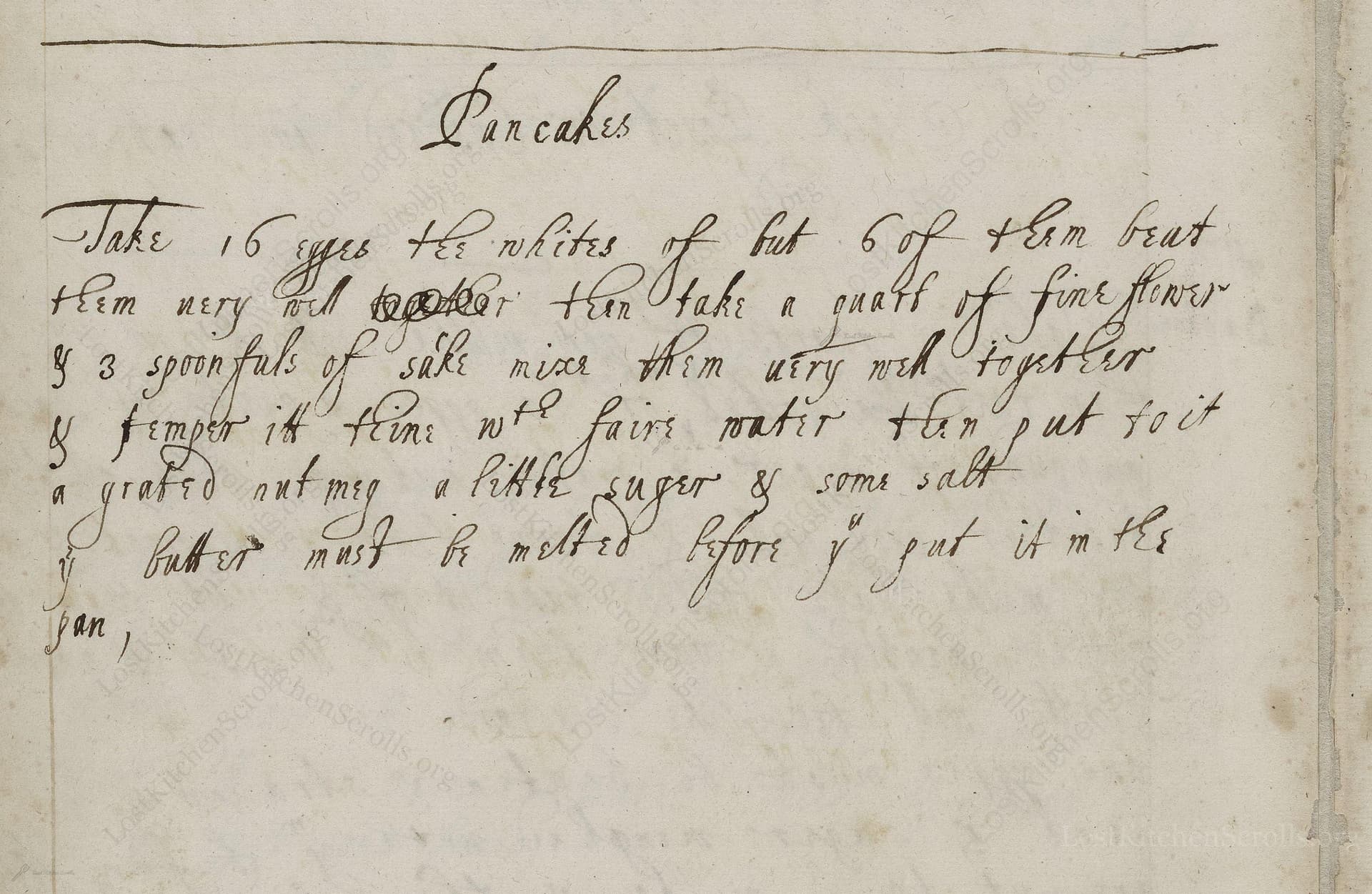Pancakes
From the treasured pages of Receipt book of Rebeckah Winche
Written by Rebecca Winch

Pancakes
"Take 16 eges the whites of but 6 of them beat them wery will togeather & take a quart of fine flower & 3 spoonfulls of sake mixe & temper it fine wth faire water then put to it a grated nut meg a litte sugar & some salt & butterr must be melted before ye put it in the pan,"
Note on the Original Text
In the 17th century, recipes were written as reminders for experienced cooks, so quantities and techniques are often imprecise. Spelling was highly variable (e.g., 'eges' for eggs, 'wery will' for very well, 'mixe & temper it fine wth faire water') and not standardized. The recipe assumes readers know what pancake batter should look and feel like. Measurements are broad estimates, reliant on the skill of the cook.

Title
Receipt book of Rebeckah Winche (1666)
You can also click the book image above to peruse the original tome
Writer
Rebecca Winch
Era
1666
Publisher
Unknown
Background
Step into the 17th-century kitchen with Rebecca Winch, where hearty feasts and time-honored recipes whisper secrets of early English cooking. From savory pies to delicate sweets, this charming volume offers a sumptuous glimpse into culinary history.
Kindly made available by
Folger Shakespeare Library
This pancake recipe comes from the late 17th century, specifically from the handwritten collection of Rebecca Winch, who lived in England and died in 1713. The recipe dates from around 1666—a time when household cookery books were treasured and recipes were passed down through families. Unsurprisingly, these pancakes differ from modern ones by their richness: they use an abundance of eggs, and the inclusion of sake displays the globalization of early modern English pantries. Such recipes were often used in grand households and represented status as much as sustenance.

The batter would have been mixed in large, sturdy earthenware bowls, beaten vigorously by hand with a wooden spoon or a birch twig whisk. The pancakes were cooked in heavy iron pans or skillets over the open hearth fire, with the butter melted directly in the pan before each batch. Plates would be pewter or pottery, and serving would be immediate to enjoy the pancakes hot.
Prep Time
15 mins
Cook Time
30 mins
Servings
10
We've done our best to adapt this historical recipe for modern kitchens, but some details may still need refinement. We warmly welcome feedback from fellow cooks and culinary historians — your insights support the entire community!
Ingredients
- 16 large eggs (only 6 egg whites, all 16 yolks)
- 4 cups fine wheat flour
- 3 tablespoons (1.5 fl oz) sake (or dry sherry or white wine as substitute)
- 2 to 2.5 cups water (enough to create smooth, crepe-like batter)
- 1 whole nutmeg, grated
- 1/4 cup white sugar
- pinch of salt
- 3.5 tablespoons (1.75 oz) unsalted butter (plus more for cooking if needed)
Instructions
- To make these 17th-century pancakes with imperial measurements, start by taking 16 eggs, but only use the whites from 6 of them and the yolks from all 16.
- Whisk together until well combined.
- Add 4 cups of fine wheat flour to the eggs.
- Mix in 3 tablespoons (about 1.5 fl oz) of sake—if sake is unavailable, use a dry sherry or white wine.
- Gradually mix in enough fresh water (about 2 to 2.5 cups) until a smooth, pourable batter forms.
- Season with a whole grated nutmeg, about 1/4 cup of sugar, and a pinch of salt.
- Melt about 3.5 tablespoons (1.75 oz) of butter.
- Before cooking, make sure the pan is hot and well-buttered, then pour in the batter, cooking as for crepes or thin pancakes.
- Serve warm, perhaps with a little more sugar or syrup if desired.
Estimated Calories
320 per serving
Cooking Estimates
It takes about 15 minutes to prepare the batter and another 30 minutes to cook all the pancakes. Each serving contains around 320 calories, and you will get about 10 pancakes from this recipe.
As noted above, we have made our best effort to translate and adapt this historical recipe for modern kitchens, taking into account ingredients nowadays, cooking techniques, measurements, and so on. However, historical recipes often contain assumptions that require interpretation.
We'd love for anyone to help improve these adaptations. Community contributions are highly welcome. If you have suggestions, corrections, or cooking tips based on your experience with this recipe, please share them below.
Join the Discussion
Rate This Recipe

Den Bockfisch In Einer Fleisch Suppen Zu Kochen
This recipe hails from a German manuscript cookbook compiled in 1696, a time whe...

Die Grieß Nudlen Zumachen
This recipe comes from a rather mysterious manuscript cookbook, penned anonymous...

Ein Boudain
This recipe comes from an anonymous German-language manuscript cookbook from 169...

Ein Gesaltzen Citroni
This recipe, dating from 1696, comes from an extensive anonymous German cookbook...
Browse our complete collection of time-honored recipes



